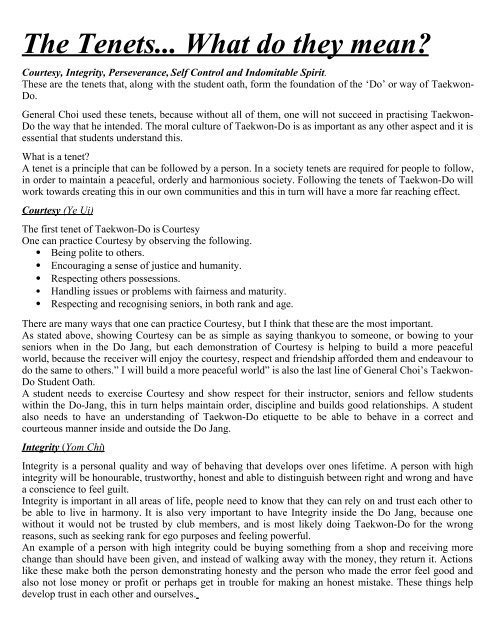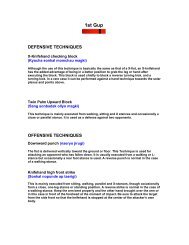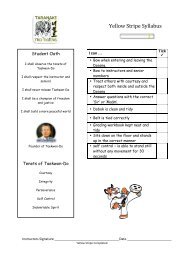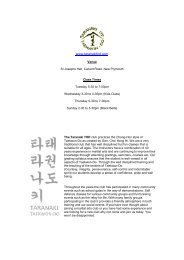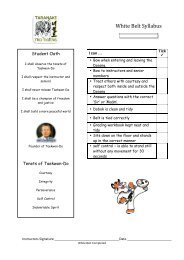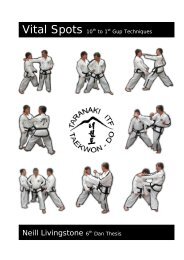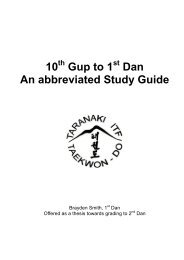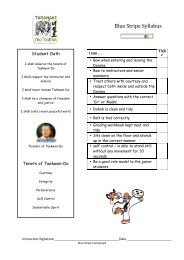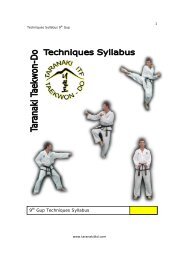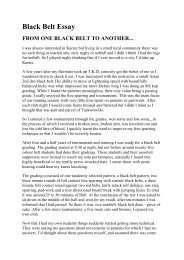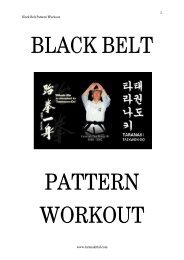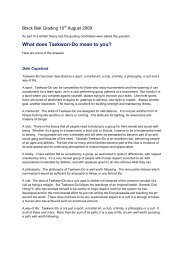Tae Kwon Do Essay - Taranaki ITF Taekwondo
Tae Kwon Do Essay - Taranaki ITF Taekwondo
Tae Kwon Do Essay - Taranaki ITF Taekwondo
- No tags were found...
You also want an ePaper? Increase the reach of your titles
YUMPU automatically turns print PDFs into web optimized ePapers that Google loves.
The Tenets... What do they mean<br />
Courtesy, Integrity, Perseverance, Self Control and Indomitable Spirit.<br />
These are the tenets that, along with the student oath, form the foundation of the ‘<strong>Do</strong>’ or way of <strong>Tae</strong>kwon-<br />
<strong>Do</strong>.<br />
General Choi used these tenets, because without all of them, one will not succeed in practising <strong>Tae</strong>kwon-<br />
<strong>Do</strong> the way that he intended. The moral culture of <strong>Tae</strong>kwon-<strong>Do</strong> is as important as any other aspect and it is<br />
essential that students understand this.<br />
What is a tenet<br />
A tenet is a principle that can be followed by a person. In a society tenets are required for people to follow,<br />
in order to maintain a peaceful, orderly and harmonious society. Following the tenets of <strong>Tae</strong>kwon-<strong>Do</strong> will<br />
work towards creating this in our own communities and this in turn will have a more far reaching effect.<br />
Courtesy (Ye Ui)<br />
The first tenet of <strong>Tae</strong>kwon-<strong>Do</strong> is Courtesy<br />
One can practice Courtesy by observing the following.<br />
Being polite to others.<br />
Encouraging a sense of justice and humanity.<br />
Respecting others possessions.<br />
Handling issues or problems with fairness and maturity.<br />
Respecting and recognising seniors, in both rank and age.<br />
There are many ways that one can practice Courtesy, but I think that these are the most important.<br />
As stated above, showing Courtesy can be as simple as saying thankyou to someone, or bowing to your<br />
seniors when in the <strong>Do</strong> Jang, but each demonstration of Courtesy is helping to build a more peaceful<br />
world, because the receiver will enjoy the courtesy, respect and friendship afforded them and endeavour to<br />
do the same to others.” I will build a more peaceful world” is also the last line of General Choi’s <strong>Tae</strong>kwon-<br />
<strong>Do</strong> Student Oath.<br />
A student needs to exercise Courtesy and show respect for their instructor, seniors and fellow students<br />
within the <strong>Do</strong>-Jang, this in turn helps maintain order, discipline and builds good relationships. A student<br />
also needs to have an understanding of <strong>Tae</strong>kwon-<strong>Do</strong> etiquette to be able to behave in a correct and<br />
courteous manner inside and outside the <strong>Do</strong> Jang.<br />
Integrity (Yom Chi)<br />
Integrity is a personal quality and way of behaving that develops over ones lifetime. A person with high<br />
integrity will be honourable, trustworthy, honest and able to distinguish between right and wrong and have<br />
a conscience to feel guilt.<br />
Integrity is important in all areas of life, people need to know that they can rely on and trust each other to<br />
be able to live in harmony. It is also very important to have Integrity inside the <strong>Do</strong> Jang, because one<br />
without it would not be trusted by club members, and is most likely doing <strong>Tae</strong>kwon-<strong>Do</strong> for the wrong<br />
reasons, such as seeking rank for ego purposes and feeling powerful.<br />
An example of a person with high integrity could be buying something from a shop and receiving more<br />
change than should have been given, and instead of walking away with the money, they return it. Actions<br />
like these make both the person demonstrating honesty and the person who made the error feel good and<br />
also not lose money or profit or perhaps get in trouble for making an honest mistake. These things help<br />
develop trust in each other and ourselves.
Perseverance (In Nae)<br />
This tenet almost explains itself, the verb persevere in the dictionary means to be persistent and to never<br />
stop, never give in. In <strong>Tae</strong>kwon-<strong>Do</strong> this is very important, because without perseverance, one will not be<br />
able to overcome the hard physical and mental challenges that will be found both inside and outside of the<br />
<strong>Do</strong> Jang. One must also persevere while listening, and have patience to ask questions only when the<br />
instructor allows or has finished talking.<br />
There is an old Oriental saying, “Patience leads to value or merit, and one can make a peaceful home by<br />
being patient 100 times”. This means that a person who is patient is more likely to be happy and prosper in<br />
life.<br />
It is very important that a student of <strong>Tae</strong>kwon-<strong>Do</strong> sets goals, and achieves them, persevering until each<br />
goal is met and then setting new goals, which may include getting your next rank, attending and winning<br />
the next tournament or helping others to achieve. By setting goals such as this the student will continue to<br />
gain personally from <strong>Tae</strong>kwon-do and will not lose interest.<br />
Self Control (Guk Gi)<br />
Self Control is very important inside and outside the <strong>Do</strong> Jang, because it is important to hold back from<br />
doing things and think about them first. For example, many children are taught by their parents to count to<br />
ten before reacting to something that may have hurt or offended them in order to prevent a situation from<br />
escalating, a child who does this is showing self control.<br />
Self Control in the <strong>Do</strong> Jang will not need to be like this, as members of that <strong>Do</strong> Jang will be Courteous and<br />
events that will hurt and offend students should not arise, but this doesn’t go to say that self control is not<br />
needed inside the <strong>Do</strong> Jang.<br />
Obeying the instructions given to you by your seniors, being quiet, standing still and not fidgeting with<br />
your <strong>Do</strong> Bok and making controlled or no contact during free sparring, are all actions that show Self<br />
Control, and if the members exercise this Self Control, the <strong>Do</strong> Jang will be an orderly, peaceful and<br />
enjoyable place to be in.<br />
Indomitable Spirit (Baekjool Boolgool).<br />
To have Indomitable Spirit is to confront injustice, no matter what odds are pitted against you, and do so<br />
without fear or hesitation. However one must also develop good judgement and the ability to assess each<br />
situation as it arises, as sometimes going against all the odds is unwise, rather than an act of Indomitable<br />
Spirit.<br />
A good example of Indomitable Spirit is Mrs Dale Copeland a 63 year old Second Degree Black Belt from<br />
our club, <strong>Taranaki</strong> <strong>Tae</strong>kwon-<strong>Do</strong>. She rarely misses a training session and is always willing to go where the<br />
going gets tough and help out the club. Despite her advancing years, she still keeps progressing with her<br />
<strong>Tae</strong>kwon-<strong>Do</strong> and intends to grade for her Third Degree in the near future. This is one of the most close to<br />
home examples of Indomitable Spirit, and a very good one at that.<br />
In conclusion, the <strong>Tae</strong>kwon-do tenets are vital not only to training, but to living a good life. One will need<br />
to abide by them to have a happy and peaceful life and be successful with their <strong>Tae</strong>kwon-<strong>Do</strong>.<br />
Tod Rookes


